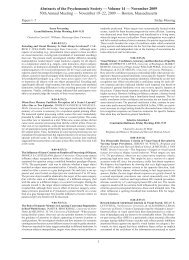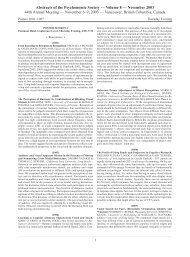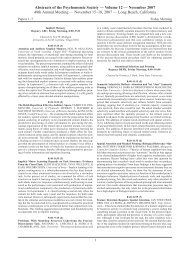Abstracts 2005 - The Psychonomic Society
Abstracts 2005 - The Psychonomic Society
Abstracts 2005 - The Psychonomic Society
Create successful ePaper yourself
Turn your PDF publications into a flip-book with our unique Google optimized e-Paper software.
Posters 4044–4050 Saturday Noon<br />
sponded more slowly to positive targets following negative contexts<br />
(RT = 1,139 msec) than to positive targets following positive contexts<br />
(RT = 1,002 msec). In contrast, subjects responded more quickly to negative<br />
targets following positive contexts (RT = 939 msec) than to negative<br />
targets following negative contexts (RT = 989 msec). <strong>The</strong>se results<br />
indicate that contextual novelty is affected by the interaction between<br />
the emotional valences of the context and the unexpected event.<br />
(4044)<br />
Individual Differences in Memory for Bizarre and Common Verbal<br />
Information. JAMES B. WORTHEN, BRETT J. MOSS, LESLIE A.<br />
HAYDEL, BLAITHIN D. MACMAHON, & SARAH C. SAVOY, Southeastern<br />
Louisiana University—Relationships between six personality<br />
variables and each of three different measures of recall for bizarre and<br />
common sentences were examined. <strong>The</strong> personality variables investigated<br />
included measures of sensation seeking, novelty experiencing,<br />
desire for novelty, arousal-seeking tendency, social potency, and conservatism.<br />
Recall was measured in terms of sentences accessed, target<br />
words recovered per accessed sentence, and misplaced target<br />
words. Results from 180 undergraduate students indicated that both<br />
arousal seeking and conservatism were positively related to a bizarreness<br />
advantage in sentences accessed. In addition, high social potency was<br />
related to the recovery of more details from common than from bizarre<br />
sentences, and high desire for novelty was related to an increased<br />
bizarre misplacement effect. <strong>The</strong> results are discussed in terms of current<br />
explanations of the effects of bizarreness on memory.<br />
(4045)<br />
Blowing Up T–N-T: Interference Instructions Lead to “Suppression.”<br />
BRIAN CRABB, CARLI JENSEN, MERYL MARTIN, & MEGAN<br />
JENSEN, Western Washington University—Anderson and Green’s (2001)<br />
“think–no-think” paradigm claims that blocking the entry into conscious<br />
awareness of targets from previously learned word pairs leads<br />
to lower later recall of the targets. However, because no behavioral response<br />
is measured during these “no-think” trials, it is not clear what<br />
participants are actually doing. We have found evidence that many<br />
participants in this task use an interference strategy (thinking of things<br />
other than the target) to not think of the target, rather than use the suppression<br />
strategy that Anderson and Green assume they are using. Furthermore,<br />
we find that giving participants interference instructions for<br />
the “no-think” trials leads to reduced memory for those words. Together,<br />
these findings suggest that Anderson and Green’s findings are<br />
best explained by interference rather than by suppression.<br />
(4046)<br />
Sleep Benefits Declarative Memory Consolidation: Sleep-Dependent<br />
Resistance to Interference (SDRI). JEFFREY M. ELLENBOGEN,<br />
Harvard Medical School, & JUSTIN C. HULBERT, DAVID F. DINGES,<br />
& SHARON L. THOMPSON-SCHILL, University of Pennsylvania—<br />
<strong>The</strong>re is considerable evidence that sleep improves implicit memory<br />
consolidation in humans. However, the role of sleep in declarative (hippocampally<br />
mediated) memory remains controversial. <strong>The</strong> purpose of<br />
this study is to clarify whether, and in what manner, sleep affects declarative<br />
memory. In two experiments, participants learned word pairs,<br />
then were tested after a 12-h retention period that either included sleep<br />
or consisted entirely of wakefulness. Experiment 1 assessed cued recall<br />
after the delay; Experiment 2 assessed the resilience of such memories<br />
to retroactive interference after the delay. Results demonstrate<br />
two significant findings: a benefit of sleep, when compared with wakefulness,<br />
for cued recall of word pairs and a robust benefit of sleep in<br />
preventing interference. We conclude that sleep benefits declarative<br />
memory consolidation, rendering memories resistant to subsequent interference.<br />
<strong>The</strong>se findings have broad implications for understanding<br />
the processes of memory, the purpose of sleep, and their relationship.<br />
(4047)<br />
Expanding Retrieval Does Not Improve Long-Term Retention. JEF-<br />
FREY D. KARPICKE & HENRY L. ROEDIGER III, Washington Uni-<br />
112<br />
versity (sponsored by Henry L. Roediger III)—Expanding retrieval<br />
practice (Landauer & Bjork, 1978) is widely believed to be a superior<br />
technique for promoting long-term retention (relative to equally<br />
spaced retrieval and other types of practice). In two experiments using<br />
GRE vocabulary word pairs, we found that expanding retrieval produced<br />
modest short-term benefits (10 min after learning), conceptually<br />
replicating Landauer and Bjork. However, equally spaced retrieval<br />
produced superior long-term retention (2 days later). This<br />
pattern was observed under conditions with or without feedback during<br />
the learning phase. We argue that the key factor for promoting retention<br />
is having an initial retrieval attempt after a brief delay (thereby<br />
making it more effortful and difficult), not expanding the interval between<br />
repeated tests. Expanding retrieval is not the most effective<br />
spaced retrieval technique for enhancing long-term retention.<br />
(4048)<br />
Determinants of Individual Differences in Current Events Knowledge:<br />
A Longitudinal Study. DAVID Z. HAMBRICK, Michigan State<br />
University, & ELIZABETH J. MEINZ & JONATHAN C. PETTIBONE,<br />
Southern Illinois University, Edwardsville—Research has established<br />
that acquired knowledge is a major source of individual differences in<br />
cognitive performance. What, then, contributes to individual differences<br />
in knowledge? This study investigated determinants of individual<br />
differences in knowledge of politics. <strong>The</strong> study occurred in two<br />
sessions separated by 2.5 months. In Session 1, participants performed<br />
tests to assess (1) cognitive ability factors, (2) knowledge of politics,<br />
and (3) personality and interest factors. In Session 2, which occurred<br />
immediately following the 2004 U.S. general election, participants<br />
completed tests to assess knowledge of politics acquired since Session<br />
1. Structural equation modeling revealed strong effects of cognitive<br />
ability on acquisition of political knowledge. However, there were independent<br />
effects of nonability factors. Specifically, a personality factor<br />
reflecting intellectual openness predicted interest in politics,<br />
which in turn predicted exposure to and acquisition of political information.<br />
Thus, there was evidence for two predictive pathways—an<br />
ability pathway and a nonability pathway.<br />
(4049)<br />
Locus of Talker Variability Effects in Primary and Secondary Memory<br />
Search for Spoken Words. WINSTON D. GOH, National University<br />
of Singapore (sponsored by David B. Pisoni)—Previous work on<br />
talker variability effects in memory for spoken words suggests that<br />
having words spoken by multiple rather than single talkers was detrimental<br />
in short-term memory (STM) tasks but facilitative in longterm<br />
memory (LTM) tasks. It has been suggested that variability disrupts<br />
processing fluency in STM tasks but that, in LTM tasks, multiple<br />
talkers provide unique voice cues that aid retrieval. Interpreting the<br />
locus of these effects is complicated by variations across tasks. <strong>The</strong><br />
present study investigated variability effects in auditory memory<br />
search, using a single task that had a primary and secondary memory<br />
version—the two-memory paradigm (Wickens, Moody, & Dow, 1981)<br />
variant of Sternberg’s (1966) memory search task. <strong>The</strong> magnitude of<br />
variability effects was larger for secondary than for primary memory.<br />
Memory set size did not interact with variability, suggesting that the<br />
locus of variability effects is at the retrieval stage and not at the processing<br />
stage.<br />
(4050)<br />
Generating Study Items Increases Older Children’s Reliance on Gist<br />
and Younger Children’s Reliance on Verbatim Memories. TIMOTHY<br />
N. ODEGARD, University of Texas, Arlington, ROBYN E. HOLLIDAY,<br />
University of Kent, Canterbury, & CHARLES J. BRAINERD & VALERIE<br />
F. REYNA, Cornell University (sponsored by Charles J. Brainerd)—<strong>The</strong><br />
Battig and Montague norms were used to investigate the effects of an<br />
encoding manipulation (read versus generate) and an instructional<br />
manipulation (accept targets, accept related lures, accept targets and<br />
related lures) on 7- to 8-year-old and 10- to 11-year-old children’s true<br />
and false recognition. Children studied two blocks of four categorical





